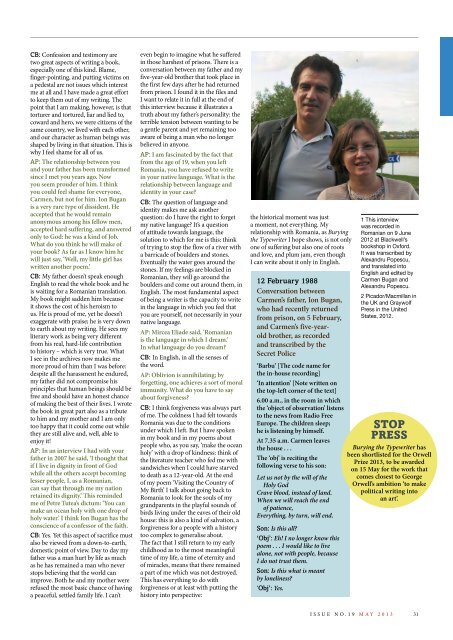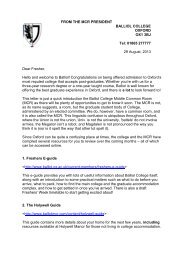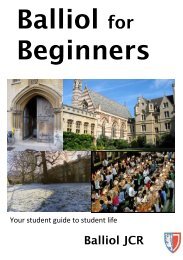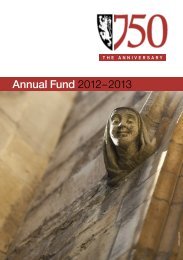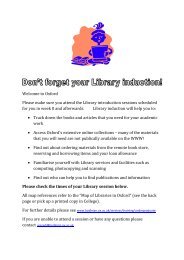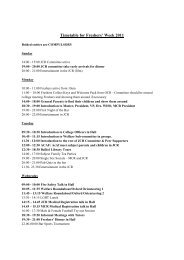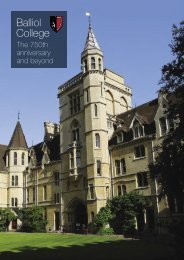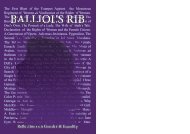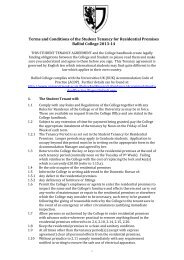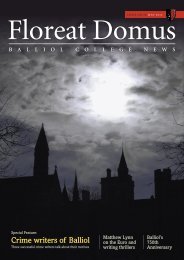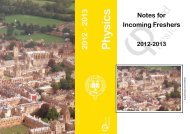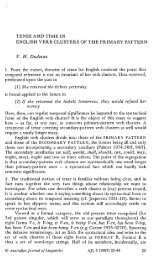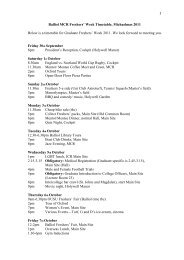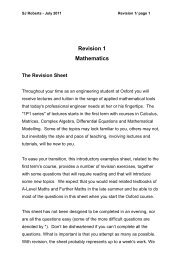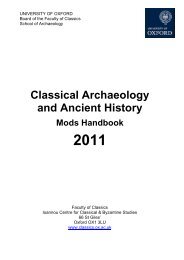Issue 19, 2013 - Balliol College - University of Oxford
Issue 19, 2013 - Balliol College - University of Oxford
Issue 19, 2013 - Balliol College - University of Oxford
Create successful ePaper yourself
Turn your PDF publications into a flip-book with our unique Google optimized e-Paper software.
CB: Confession and testimony are<br />
two great aspects <strong>of</strong> writing a book,<br />
especially one <strong>of</strong> this kind. Blame,<br />
finger-pointing, and putting victims on<br />
a pedestal are not issues which interest<br />
me at all and I have made a great effort<br />
to keep them out <strong>of</strong> my writing. The<br />
point that I am making, however, is that<br />
torturer and tortured, liar and lied to,<br />
coward and hero, we were citizens <strong>of</strong> the<br />
same country, we lived with each other,<br />
and our character as human beings was<br />
shaped by living in that situation. This is<br />
why I feel shame for all <strong>of</strong> us.<br />
AP: The relationship between you<br />
and your father has been transformed<br />
since I met you years ago. Now<br />
you seem prouder <strong>of</strong> him. I think<br />
you could feel shame for everyone,<br />
Carmen, but not for him. Ion Bugan<br />
is a very rare type <strong>of</strong> dissident. He<br />
accepted that he would remain<br />
anonymous among his fellow men,<br />
accepted hard suffering, and answered<br />
only to God: he was a kind <strong>of</strong> Job.<br />
What do you think he will make <strong>of</strong><br />
your book As far as I know him he<br />
will just say, ‘Well, my little girl has<br />
written another poem.’<br />
CB: My father doesn’t speak enough<br />
English to read the whole book and he<br />
is waiting for a Romanian translation.<br />
My book might sadden him because<br />
it shows the cost <strong>of</strong> his heroism to<br />
us. He is proud <strong>of</strong> me, yet he doesn’t<br />
exaggerate with praise; he is very down<br />
to earth about my writing. He sees my<br />
literary work as being very different<br />
from his real, hard-life contribution<br />
to history – which is very true. What<br />
I see in the archives now makes me<br />
more proud <strong>of</strong> him than I was before:<br />
despite all the harassment he endured,<br />
my father did not compromise his<br />
principles that human beings should be<br />
free and should have an honest chance<br />
<strong>of</strong> making the best <strong>of</strong> their lives. I wrote<br />
the book in great part also as a tribute<br />
to him and my mother and I am only<br />
too happy that it could come out while<br />
they are still alive and, well, able to<br />
enjoy it!<br />
AP: In an interview I had with your<br />
father in 2007 he said, ‘I thought that<br />
if I live in dignity in front <strong>of</strong> God<br />
while all the others accept becoming<br />
lesser people, I, as a Romanian,<br />
can say that through me my nation<br />
retained its dignity.’ This reminded<br />
me <strong>of</strong> Petre Tutea’s dictum: ‘You can<br />
make an ocean holy with one drop <strong>of</strong><br />
holy water.’ I think Ion Bugan has the<br />
conscience <strong>of</strong> a confessor <strong>of</strong> the faith.<br />
CB: Yes. Yet this aspect <strong>of</strong> sacrifice must<br />
also be viewed from a down-to-earth,<br />
domestic point <strong>of</strong> view. Day to day my<br />
father was a man hurt by life as much<br />
as he has remained a man who never<br />
stops believing that the world can<br />
improve. Both he and my mother were<br />
refused the most basic chance <strong>of</strong> having<br />
a peaceful, settled family life. I can’t<br />
even begin to imagine what he suffered<br />
in those harshest <strong>of</strong> prisons. There is a<br />
conversation between my father and my<br />
five-year-old brother that took place in<br />
the first few days after he had returned<br />
from prison. I found it in the files and<br />
I want to relate it in full at the end <strong>of</strong><br />
this interview because it illustrates a<br />
truth about my father’s personality: the<br />
terrible tension between wanting to be<br />
a gentle parent and yet remaining too<br />
aware <strong>of</strong> being a man who no longer<br />
believed in anyone.<br />
AP: I am fascinated by the fact that<br />
from the age <strong>of</strong> <strong>19</strong>, when you left<br />
Romania, you have refused to write<br />
in your native language. What is the<br />
relationship between language and<br />
identity in your case<br />
CB: The question <strong>of</strong> language and<br />
identity makes me ask another<br />
question: do I have the right to forget<br />
my native language It’s a question<br />
<strong>of</strong> attitude towards language, the<br />
solution to which for me is this: think<br />
<strong>of</strong> trying to stop the flow <strong>of</strong> a river with<br />
a barricade <strong>of</strong> boulders and stones.<br />
Eventually the water goes around the<br />
stones. If my feelings are blocked in<br />
Romanian, they will go around the<br />
boulders and come out around them, in<br />
English. The most fundamental aspect<br />
<strong>of</strong> being a writer is the capacity to write<br />
in the language in which you feel that<br />
you are yourself, not necessarily in your<br />
native language.<br />
AP: Mircea Eliade said, ‘Romanian<br />
is the language in which I dream.’<br />
In what language do you dream<br />
CB: In English, in all the senses <strong>of</strong><br />
the word.<br />
AP: Oblivion is annihilating; by<br />
forgetting, one achieves a sort <strong>of</strong> moral<br />
immunity. What do you have to say<br />
about forgiveness<br />
CB: I think forgiveness was always part<br />
<strong>of</strong> me. The coldness I had felt towards<br />
Romania was due to the conditions<br />
under which I left. But I have spoken<br />
in my book and in my poems about<br />
people who, as you say, ‘make the ocean<br />
holy’ with a drop <strong>of</strong> kindness: think <strong>of</strong><br />
the literature teacher who fed me with<br />
sandwiches when I could have starved<br />
to death as a 12-year-old. At the end<br />
<strong>of</strong> my poem ‘Visiting the Country <strong>of</strong><br />
My Birth’ I talk about going back to<br />
Romania to look for the souls <strong>of</strong> my<br />
grandparents in the playful sounds <strong>of</strong><br />
birds living under the eaves <strong>of</strong> their old<br />
house: this is also a kind <strong>of</strong> salvation, a<br />
forgiveness for a people with a history<br />
too complex to generalise about.<br />
The fact that I still return to my early<br />
childhood as to the most meaningful<br />
time <strong>of</strong> my life, a time <strong>of</strong> eternity and<br />
<strong>of</strong> miracles, means that there remained<br />
a part <strong>of</strong> me which was not destroyed.<br />
This has everything to do with<br />
forgiveness or at least with putting the<br />
history into perspective:<br />
the historical moment was just<br />
a moment, not everything. My<br />
relationship with Romania, as Burying<br />
the Typewriter I hope shows, is not only<br />
one <strong>of</strong> suffering but also one <strong>of</strong> roots<br />
and love, and plum jam, even though<br />
I can write about it only in English.<br />
12 February <strong>19</strong>88<br />
Conversation between<br />
Carmen’s father, Ion Bugan,<br />
who had recently returned<br />
from prison, on 5 February,<br />
and Carmen’s five-yearold<br />
brother, as recorded<br />
and transcribed by the<br />
Secret Police<br />
‘Barbu’ [The code name for<br />
the in-house recording]<br />
‘In attention’ [Note written on<br />
the top-left corner <strong>of</strong> the text]<br />
6.00 a.m., in the room in which<br />
the ‘object <strong>of</strong> observation’ listens<br />
to the news from Radio Free<br />
Europe. The children sleep;<br />
he is listening by himself.<br />
At 7.35 a.m. Carmen leaves<br />
the house . . .<br />
The ‘obj’ is reciting the<br />
following verse to his son:<br />
Let us not by the will <strong>of</strong> the<br />
Holy God<br />
Crave blood, instead <strong>of</strong> land.<br />
When we will reach the end<br />
<strong>of</strong> patience,<br />
Everything, by turn, will end.<br />
Son: Is this all<br />
‘Obj’: Eh! I no longer know this<br />
poem . . . I would like to live<br />
alone, not with people, because<br />
I do not trust them.<br />
Son: Is this what is meant<br />
by loneliness<br />
‘Obj’: Yes.<br />
1 This interview<br />
was recorded in<br />
Romanian on 9 June<br />
2012 at Blackwell’s<br />
bookshop in <strong>Oxford</strong>.<br />
It was transcribed by<br />
Alexandru Popescu,<br />
and translated into<br />
English and edited by<br />
Carmen Bugan and<br />
Alexandru Popescu.<br />
2 Picador/Macmillan in<br />
the UK and Graywolf<br />
Press in the United<br />
States, 2012.<br />
STOP<br />
PRESS<br />
Burying the Typewriter has<br />
been shortlisted for the Orwell<br />
Prize <strong>2013</strong>, to be awarded<br />
on 15 May for the work that<br />
comes closest to George<br />
Orwell’s ambition ‘to make<br />
political writing into<br />
an art’.<br />
issue no.<strong>19</strong> MAY <strong>2013</strong><br />
31


